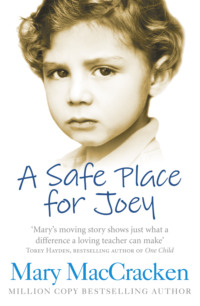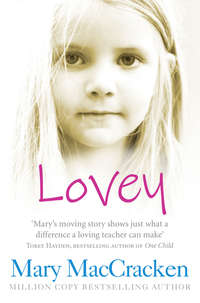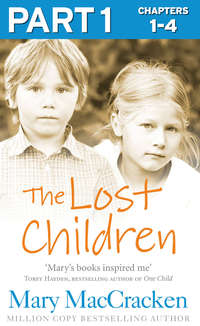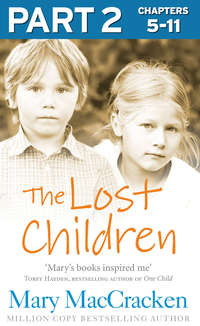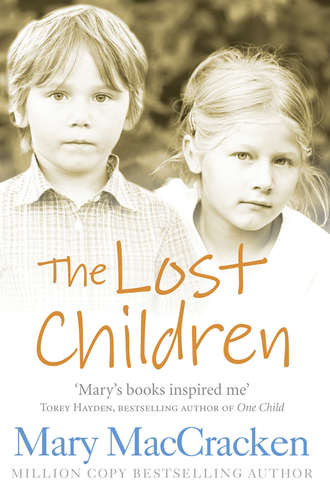
Полная версия
The Lost Children


Contents
Cover
Title Page
Dedication
Epigraph
Chapter 1
Chapter 2
Chapter 3
Chapter 4
Chapter 5
Chapter 6
Chapter 7
Chapter 8
Chapter 9
Chapter 10
Chapter 11
Chapter 12
Chapter 13
Chapter 14
Chapter 15
Chapter 16
Chapter 17
Chapter 18
Chapter 19
Chapter 20
Chapter 21
Chapter 22
Chapter 23
Chapter 24
Chapter 25
Teacher
Also by Mary MacCraken
Coming soon …
Exclusive sample chapter
Copyright
About the Publisher
Dedication
For my mother and first teacher:
Florence Ferguson Burnham
Epigraph
He drew a circle that shut me out –
Heretic, rebel, a thing to flout.
But Love and I had the wit to win:
We drew a circle that took him in!
– Edwin Markham
Chapter 1
I encountered the school without warning, sandwiching the appointment between one at the Young Women’s Christian Association (YWCA) and another at the Cerebral Palsy Clinic, where I had been many times before. It was to be a routine visit; my tennis racket was packed in the back seat of the car in case we finished early enough for a set before our children arrived home from school.
And now, nothing can erase that room, that school. In the slide file of my mind it has a perfect print: each line and shadow as clear now as it was on that first morning. Sunlight slanted across the blue-painted floor surrounding the woman at the piano dressed in a flowered blouse, rose and green, and a green cotton skirt. Small chairs were placed in a semicircle around the piano, and in them sat perhaps twenty children and six or seven adults. The adults, particularly the man, had their knees bunched up to their chins, and yet they seemed comfortable, smiling, calling back and forth across the room to each other.
But there was something strange about the children. It was not their bodies; no one was deformed. In fact, most were beautifully made. There was a translucent quality in their faces, but there was also something more, or perhaps less: a stillness in their expression. These children did not call to each other or playfully poke or tease; instead they sat silently, turned inward.
Suddenly the room became filled with noise and motion. Chairs were shoved to the edge of the room while the Director thumped loudly on the piano. The children galloped in pairs around and around until suddenly one tiny girl broke away and flung herself to the floor, screaming high-pitched, indecipherable screams. Her small legs, clad in red tights, were rigid, spread-eagled against the blue floor. She pulled her plaid skirt over her head and beneath it screamed:
“Vacuum cleaner. Look! Aaaaahhh. Aaaahhhh. Get it! Oooohhh. Aaaaahhhh. Get it! Here it comes! Aaaa. Aaaa.” She sat up, pointing toward the door. Her terror was real: I felt it inside me, and I turned towards the door, expecting to see a monster vacuum cleaner rolling in, motor running, upright, unstoppable, sucking us all into its giant bag.
But there was nothing, and gradually the terror in the room dissolved. The piano quietened and moved to the smoother rhythm of a waltz, and the children changed from galloping to a skating motion, pushing their feet across the blue floor. No one had stopped to look at the small girl in the middle of the floor or for the vacuum cleaner: they skated on, stepping over her arm or leg if they were jostled and pushed too close to her.
Only her teacher knelt beside her, talking softly, touching her shoulder, her hair. Then gathering her up, she held the child against her own body until the terror dissolved, was gone. As surely as I had seen the vacuum cleaner, I felt the loving that had displaced the terror. In that instant, that clear, bright second, with no warning, I knew that I would one day work in this school. I felt I had been here before, some other time or else some other place; it was familiar. I was at home.
They stayed like that, the child standing, the woman kneeling with her arms about the child for perhaps a minute more; then the little girl’s enormous eyes left the door and she put her hand against the teacher’s head. They rose then and, hand in hand, rejoined the circle of skaters.
The woman beside me touched my arm. “My God, Mary, I can’t take much more of this. Let’s get out of here.”
I turned to look at her, my friend Ellen, here with me on the assignment from the Junior League to investigate the school for seriously emotionally disturbed children, to visit and see if it would have good placement jobs for our volunteers; and she seemed suddenly far away. I had known her since I was a child, I had been with her when she bought the tweed skirt and blue cashmere sweater that she was wearing; and yet when she spoke to me it was as if her words were coming from a distant country. How could we leave? It seemed to me that we were on the brink of an enormous secret.
Then as my thoughts returned to her, I saw that she had been moved, but not to wonder. Revulsion showed in her face, and I did not know how to tell her about the excitement that I felt.
I followed her away from the room, out onto the porch of the big old white-frame building that housed the school. She said again:
“Mary, this place is terrible. They’re crazy. Those children are crazy. Mad. Just little kids and they’re completely gone. No one in the League could work here. Think what it would be like to go home to your children after this. Come on, let’s go. We’ll have lunch and then we’ll go to the C. P. Clinic and still have time to get in some tennis before the kids get home.”
Crazy. Were they? And what does “crazy” mean? Did she think perhaps that it was catching – that we might take it home to our children, like measles or a bad cold? What was it? What caused it?
“You go,” I said. “I’ll just be a few minutes, talk to the Director, get some pamphlets and a little information, and then I’ll meet you for lunch, okay?”
Ellen looked at me curiously. “You’re going back in there? What for? There’s no point.” Then perhaps recognizing some stubbornness in me reminiscent of our childhood, she sighed. “Oh all right. You’re a good, responsible placement chairman. Where do you want to eat?”
Ah, good. She was going. “Doesn’t matter. Anywhere. You choose.”
“Well, I did want to pick up a wedding present for Betsy at Jensen’s. Suppose I do that – then I’ll meet you at Lord and Taylor’s and we can eat there.”
“Great,” I said. “I’ll see you in an hour.”
I stood on the steps of the school watching Ellen pull out of the driveway, excited, but knowing that there was still time to change my mind. Instead of going back inside, I, too, could leave. I could get into my car, raise the white convertible top, and drive my way back to my safe, suburban life. I could surprise Ellen at Jensen’s, and while she shopped I could linger, drinking in the lovely things, touching a silver bowl, running my finger along the edge of a crystal vase when the salesman turned away, comfortable in a familiar world.
And what if I went back inside? What then? What kind of world lay there, just a few feet away? If I opened the door what would I find – what would I learn?
I lingered a moment more on the steps – then I turned and went back inside the school.
The Director’s office was in the basement, past the lunchroom. There was a musty smell; and though the walls had been painted yellow to compensate for the lack of windows, there was a distinct greenish cast to both the walls and the air. I stood in the doorway of the office; the Director, Mrs. Fleming, was on the phone and I waited hesitantly in the doorway until she finished.
The rest of the memory is blurred. I know I asked many questions and she replied with words like “emotionally disturbed,” “schizophrenic,” “autistic,” which rolled across my ears as sounds rather than words, almost meaningless to me then. She mentioned the school’s tremendous financial needs, the ratio of four children to one teacher, the newness of the field, the lack of agreement as to causes: some experts citing heredity, others environment, still others, biochemical causes. She spoke of the waiting list of children they could not accommodate and her dream of a new building, a larger school.
“The children?” I asked. “Can you tell me a little more about the children?”
“Well, as you can see,” she said, “they are physically healthy, attractive children. Their intelligence is average or above average, but they’re ill, and this illness causes them to function far below their age level, to live inside themselves and shut out the world. They are not sure who they are. They have great difficulty with language, with relationships, with other people; their behavior is often bizarre, puzzling.”
I stayed well over an hour, fascinated, intrigued, forgetting the time until I heard the children gathering in the lunchroom.
But excitement bubbled inside me, could not be put down. I wanted to teach there. Absurd? Perhaps. But I wanted it, had to do it, knew that I could. Unsure of many things, I was sure of this. One last question: What qualifications did her teachers need?
The Director smiled, “Certification in special education – preferably a master’s degree in teaching the emotionally disturbed – a listening heart and a strong back.”
I thanked her. My own heart was very quiet. I hadn’t even finished Wellesley, having left at the end of my sophomore year to marry Larry.
Chapter 2
But all summer long the children of the school walked through my dreams, and in September I went back to the school to ask if I could work there as a volunteer teacher’s aide two days a week. The morning was warm and the windows of the school were open, and I heard again the piano as I climbed the wide wooden steps.
More strongly than ever the déjà-vu feeling returns; perhaps not this same school, but somewhere, sometime, I worked in a school such as this. There is a remembered knowledge that is certain without being specific.
I find the Director in her office.
“Good morning,” she says. “Can I help you?”
“I’m Mary MacCracken,” I remind her. “I was here last June. I … uh. Well, what I wondered was … do you think it would be possible for me to work as a volunteer with one of your teachers?”
“Oh, yes, I remember now. You were here with the other woman from the Junior League. Yes. Well now, let’s see. Yes … I think we’ll put you as a teacher’s aide with Helga. We’re delighted to have you, Mrs. … er – uh …”
“Mary,” I say. “My name is Mary.”
“Yes, of course. Mary. Go right on up to Helga’s room. As I say, we’re delighted to have you.”
I climbed the empty stairs slowly. There was no one in the room at the top of the stairs. As I stood in the hall indecisively a boy of perhaps nine or ten raced by me, his turtleneck shirt pulled completely over his head, screaming, “Jesus Christ, gonna go to Camp Lookout! God save us all!” He thundered down the stairs, and I wondered how he was able to judge their height and depth with his eyes covered.
A man came out of one of the rooms along the hall, smiled at me, and called softly to the boy: “Hey, Tom, it’s okay. Camp’s over, you’re in school,” and he walked slowly down the stairs toward the boy, who was now hesitating on the bottom step.
I continued walking along the long upstairs hall, looking in classrooms, searching for Helga’s room. They were all empty except for one classroom. A small girl watched in fascination an empty turntable revolve. A gray-eyed boy sat beside her, smiling and rocking back and forth, back and forth, until a young woman rose from the table where she was mixing paints and touched him, blocked the rocking with her hand, and he followed her back to the paint table.
A kaleidoscope of impressions was whirling through my head. Was this teacher Helga? And would she, too, be “delighted” to have me? As it turned out, she was not.
I found her finally in the bathroom with her class of four children. She was bent over the toilet bowl with a rubber plunger.
“God damn fucking stopped-up toilet. How can you toilet-train a child when the stupid toilet doesn’t even flush? Who are you?”
“Mary,” I answer. “The Director sent me to be your new volunteer teacher’s aide.”
Helga wields the rubber plunger even harder now – brown-gray hair flying straight out from her head, glasses slipping to the end of her nose. She must be fifty, arms strong and muscular, moving up and down, everything about her alive, filled with vitality. She is wearing a cotton housedress, and under it I can see wide shoulders, full breasts, narrower waist and hips – her legs strong and bare above worn, wet sneakers.
“For Christ sake,” she says in a strong German accent. “How many times do I have to tell her I don’t want any shitty volunteers? I have enough to do with the children. Go on now. Go tell her to assign you to somebody else.”
But I do not want to go. Intuitively I recognize in Helga the essence of the master teacher. I know that she is the one I want to watch; hers are the techniques I want to learn. In this school I do not feel humble or frightened or inadequate, as I often do with Larry. I am at home here and I merely smile at Helga and follow her back to her classroom, watching her quietly. I had never heard a woman swear like that before. The women I had known most intimately were lovely, quiet women – clean and soft, smelling faintly sweet, dressed always in good taste. I survey Helga in her cotton housedress and worn sneakers, and for the first time I wonder what “good taste” means.
Sunlight lies across the green linoleum floor. The walls are covered with children’s primitive finger painting; a large rocking chair is in front of the window, a low table with chairs in the middle of the room, a sandbox on the far side.
One of the boys stands in the sunlight watching the specks of dust move in the golden air currents. He is very small, perhaps five or six, with a small, square face and large gray eyes, black at the center.
Helga speaks to him. “Take off your sweater, Chris. Hang it up on the hook.”
Still he stands without moving, arms slack; only his eyes follow the golden specks of dust. I do not move to help, only watch as I sit on a corner of the sandbox, filling a muffin tin with sand and turning my muffins on a wooden board. Red-haired Jimmy sticks a crayon in each one and then pushes them back to the center of the sandpile.
Helga ignores Chris, giving him a chance to act on his own volition. She notices me and is obviously annoyed that I am still there. She no longer even addresses me directly but instead mutters toward the window concerning me.
“God in heaven. Give me patience. It is not enough that I must teach these children all day with no equipment, only leftover material and promises. Now they send me volunteers. Over and over I have told them I do not want the shitty volunteers. Volunteers to do for the children what they should do for themselves. Do they listen? No. Jesus, deliver me from these volunteers. They should take their shitty good works somewhere else.”
The last is delivered pointedly in my direction and I bend my head in concentration on my muffins.
One last remark from Helga: “Ah – well. It does not usually take us too long to get rid of them, does it?”
Helga chooses now to ignore me. All morning she never looks again in my direction. Instead, she turns once again to Chris. Her voice lifts, half a command, half a seduction: “Come now – get off that sweater and we’ll have a bit of a rock before the day begins.”
Chris slides his eyes from the dust specks toward Helga, not moving, only looking.
She settles herself in the rocking chair and sets it in motion. “Come along now,” she calls, “get along.”
And, unbelievably, the slack, motionless figure becomes a boy. Awkwardly he takes off his sweater and hangs it on a hook beneath his name, CHRIS, and then crosses the room and climbs into the wide lap of Helga. And with her legs spread wide and her foot tapping she sings to him:
“Camptown races is my song – do dah, do dah. Camptown races all day long, all the do dah day.” And if the words are wrong, it does not bother Helga or Chris.
I watch them and then, noticing an empty coffee cup lying beside the sandbox, I go next door to the bathroom and fill it with water.
“Not this one,” I say to myself as the water runs into the cup. “You will not be rid of this volunteer so easily, Helga.” And I smile at her as I carry the water back to the sandbox.
So began our relationship, Helga’s and mine, and my education. I learned more from this strong, loving woman than from any psychology or education course I have ever taken; more than from any book, no matter how distinguished the author. I watched her, remembering, imitating, gradually doing. She breathed life back into the children. Often I watched her gather a child in her arms – one who had gone off to a corner, retreating from the world. Helga would gather him up, blow on his neck, murmur some foolish joke into his ear, take his hand, start the record player, and then dance with him around the room. Her favorite dance was the polka, and as she skipped and stomped in her sneakers, gray hair flying, half carrying her small partner with her, she would sing, “There’s a garden, what a garden, only happy faces bloom there, and there’s never any gloom there …” And gradually the child would return, the faraway look would go out of his eyes, and he would seem once more to be alive, to be back in this world.
There was about Helga such a strong sense of living, of vitality, that as she came into bodily contact with a child – rocking him, holding him from attacking himself or others, kissing him, pushing him – her vitality, her excitement, her desire of life were almost visibly transferred to the child. She could not have told me any of this herself; she was totally absorbed in her work, in her children – so much so that even at the end of the same day, if someone had asked her to describe what methods or techniques she had used to solve a problem, she would not have been able to relate what she had done. She would not even have tolerated the words “methods” and “techniques”; she was the totally natural therapeutic teacher. I was privileged to be able to watch her, and I knew it. A dozen times a day I would find myself silently saying, “Yes, yes,” as I watched her with the children. It was a feeling of silent applause and I knew I must pay attention to it.
She had that rare quality of being alive, involved in, excited by, her world. Whether this is learned or an inherited talent I am not sure, but it was one of her most valuable tools in reaching these children: the electricity that was vibrant in her reached across and touched the child, often before words could.
Helga’s husband Karl worked at a clerical job; their only son was grown, living in the West, They lived in a small upstairs apartment in a two-family house, saving money all year in order to travel. Each winter during Christmas vacation they went to Puerto Rico; in the summer they rode bicycles across Europe. Looking at Helga, I would think of my own friends, my own life, our large homes, all our possessions – and yet Helga had achieved a freedom, a sense of joy, that was absent in my own life.
It was not that she always had an admirable response or even a proper one. She did not. She was no saint. But the thing was, she did respond! She was alive, she was human, she cared, and she showed us that she did. There were no pretenses to Helga. What she felt, she communicated, and because there was no veneer it came through straight and clear.
If a child, as he gradually learned or rediscovered words, came to Helga saying, “Kite,” Helga would listen, repeat, “You like the kite. Ah – get it then. Get the kite. Let’s see it now, this red kite.”
And now Jimmy, excited by the sight and feel of the kite, tugs Helga’s arm: “Kite. Fly kite. Fly kite.”
Helga sits back on her heels from where she has been kneeling beside the boy and says, “Ah, fly the kite. So you think we should fly the kite, leave our papers and crayons, and go fly the kite. Is that what you think?”
Jimmy, ordinarily listless, pale as milk beneath his red hair, hops up and down with excitement. “Fly kite, Helga. Go fly kite.”
Helga grins, satisfied with her work, with the extra words she has managed to extract from Jimmy, and says, “All right, you monkey – we’ll leave the work and go fly the kite.”
And soon all of us – the four children, myself, and Helga – have on our jackets and are trudging out to the field beyond the school, Jimmy carrying the kite. Then they run, the small red-haired boy and Helga in her sneakers. They run holding the string of the kite together, getting it started – until suddenly the kite lifts and sails up high, like hope itself, flashing, tipping against the sky, and we cheer and clap our hands.
I cannot remember now how many weeks it was before Helga spoke to me. I remember that I felt no resentment because of her silence. It seemed to me a logical thing: she was trying to do something important, and volunteers got in her way; it was natural that she be impatient with me. At the same time I had no intention of leaving.
There were other teachers in the school who were good. I watched them in morning assemblies and in the playground and at lunch, but none of them rang the bell for me the way Helga did. Her children grew faster than any others, became independent sooner – or so it seemed to me. I knew I could learn more from her than from anyone else. Whether she liked me or not was not essential. I was not lonely. I did not need her friendship; I needed her example.
For instance, I watched her teach Sarah to walk. Sarah did not walk at all when she first came to school. She was five, with pale yellow hair and the fine, silky skin of a baby. She was a week late starting school because she had been ill, so I was there when she came that first day. Her mother carried her up the stairs to Helga’s room, spread a blanket, and laid her on the floor. There Sarah curled up on her side, her thumb in her mouth. Helga said nothing; but after the mother had left, Helga slipped the blanket from beneath Sarah, folded it, and put it in the back of a closed cupboard. The little girl whimpered and cried, the other children circling around her as I have seen a flock of sea gulls do when one of the birds is injured. The morning was ruined, the children upset and fretful; no work could be done with Sarah mewling, crying, there on the floor. Another teacher might have let her keep the blanket that first day while she adjusted to the school. Not Helga. She would set no such precedent in her classroom – a five-year-old child was not treated like an infant, left lying in a blanket.



